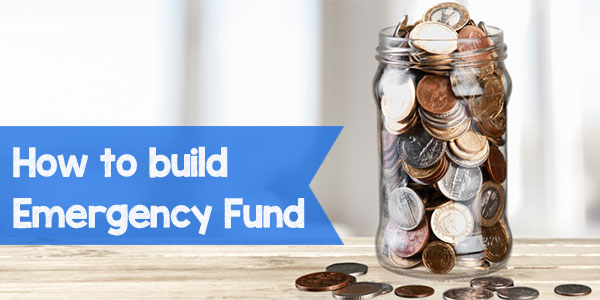An emergency fund gives you immediate cash to cover your unexpected expenses. Without one, you could end up borrowing payday loans or racking up credit card debt.
But, you may be wondering how to build an emergency fund for a rainy day, especially when you're living paycheck to paycheck. Well, the key to start building an emergency fund is to adopt a positive attitude and change your mindset. You don’t need a fat paycheck to spare cash and build an emergency fund. You need to be disciplined.
Here are a few strategies to spare cash for an emergency fund:
1. Save your tax refund:
Use your tax refund to create an emergency fund. Open a savings account in your bank and deposit your tax refund before you’re tempted to spend it.
2. Ask for a rate reduction:
Flip over your credit card. Did you see the customer care number? Call the number and have a talk with the supervisor. Request him/her for a rate reduction. If the supervisor refuses to slash interest rate, then politely tell him/her that you’ll transfer your available balance to another credit card with better features. This might force the supervisor to reduce your current interest rate.
Remember, this strategy will help you save money on interest rate when you’re a loyal and responsible customer.
3. Cut down your expenses:
Look for ways to cut down your expenses. This would help you to spare cash for your emergency fund. Here are a few tips to reduce your expenses:
- Set a programmable thermostat in your air conditioner so that you can reduce heating and cooling expenses by 20 or 30 percent.
- Carry your grocery shopping list to buy things you need and avoid buying unnecessary stuff.
- Shop around to get a better auto insurance rate.
- Travel in public bus for your commuting needs. It is far cheaper.
- Eat more at home so as to reduce your expenses in restaurants.
- Settle your debts so that you can save on the payoff amount.
4. Automate your savings:
Set a specific amount of your income to be automatically deposited into your savings account. Even a small amount can help you save a very good amount in your emergency fund.
5. Pay in cash:
We tend to spend more when using credit cards. So, a simple strategy to save more is to pay in cash. Leave your credit cards at home or carry them only when you need to make a planned expenditure.
6. Use coupons:
Cashback cards and coupons will help to funnel extra savings into your emergency fund. So, use them judiciously.
7. Install Google Chrome extensions:
Not many people know that Google Chrome extensions like PriceBlink, Ebates, Qmee, etc. can help you find great deals and coupons when shopping online. So, if you prefer to shop online, then it would be a crime to not install these extensions.
Download and install the Invisible-Hand Extension to find cheap hotels and rental cars. You can also install Wallaby Extension to find a credit card giving you the best reward.
8. Set a low target:
Make it your goal to create a short emergency fund of only $250 or $400. You can reach this goal within a few months and thus stay motivated. Just think, if you can save minimum $25 a week, then you can reach your goal in 10 weeks. If you can put $40 in your emergency fund every week, then you can save $500 in just 3 months.
Where you can keep your emergency fund
Here are your 2 options:
1. Money market account:
This is a good option when your aim is to yield higher interest rates as your balance increases. Like a regular savings account, you can access money market account easily. The only difference is you’ll get a better return than a normal savings account.
Just keep one point in mind. You may have to maintain higher minimum balance to avoid fees.
2. Normal savings account:
You can put your emergency fund in this account to access money whenever you want. This account is a good option when you’re just beginning to save money and wish to be financially prepared for the unexpected expenditures.
No matter which savings account you choose, make sure you withdraw money when an emergency situation arrives.
Don’t give up
Have you tried and failed to create an emergency fund? Please don’t let your past ruin your financial future. You may have failed in the past. But this doesn’t mean you’ll fail this time too. Rather, the knowledge you gained from your past mistakes may help you to build an emergency fund successfully this time.
Best of luck!








